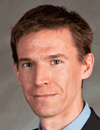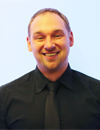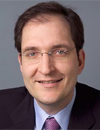Ian Baxendale
Professor, Durham UniversityIn 2012 Ian moved to Durham to take up the Chair of Synthetic Chemistry. His research interests are the design and implementation of new enabling technologies such as Flow Chemical Synthesis (FCS), Synthesis Automation Methodologies (SAM), microwave reactors and immobilised reagents and scavengers to expedite complex chemical syntheses. The success of his academic career is reflected by >135 publications (H-index=42), including several reviews and book chapters, with a total of >4500 citations. He is research active both running his own academic group but also importantly maintaining a practical presence in the laboratory. |  | | | Shawn Collins
Full Professor, Université de MontréalShawn K. Collins was born in 1974 and raised in Val d'Or, Québec. He obtained a B.Sc. (Honours) degree from Concordia University in 1996 while working with Professor Ossie S. Tee. He completed his doctoral dissertation in 2001 with Professor Alex G. Fallis at the University of Ottawa. After an NSERC postdoctoral fellowship with Professor Larry E. Overman (University of California, Irvine), he joined the faculty at Université de Montréal in September 2003 as an Assistant Professor. He was promoted to the rank of Associate Professor in 2009 and to Full Professor in 2015. Professor Collins's research group is interested in the development of novel synthetic methods, particularly involving catalysis, photochemistry and continuous flow methods. |  | | | Peter Seeberger
Managing Director, Max Planck Institute of Colloids and Interfaces, Professor Freie Universität BerlinPeter H. Seeberger studied chemistry in Erlangen (Germany) and completed a PhD in biochemistry in Boulder (USA). After a postdoctoral fellowship at the Sloan-Kettering Cancer Center Research in New York he advanced to tenured Firmenich Associate Professor of Chemistry at MIT. After six years as Professor at the Swiss Federal Institute of Technology (ETH) Zurich he assumed positions as Director at the Max-Planck Institute for Colloids and Interfaces in Potsdam and Professor at the Free University of Berlin in 2009. In addition he serves as honorary Professor at the University of Potsdam. He is a member of the governing bodies of the Max-Planck Society and the Berlin-Brandenburg Academy of Sciences. His research has been documented in over 480 peer-reviewed journal articles, four books, more than 40 patents, and more than 850 invited lectures. This work was recognized with more than 35 international awards. The research in the Seeberger laboratory has given rise to seven successful companies in the USA, Switzerland and Germany. |  | | |
|

 Add to Calendar ▼2015-02-17 00:00:002015-02-18 00:00:00Europe/LondonFlow Chemistry EuropeFlow Chemistry Europe in Berlin, Germany Berlin, Germany SELECTBIOenquiries@selectbiosciences.com
Add to Calendar ▼2015-02-17 00:00:002015-02-18 00:00:00Europe/LondonFlow Chemistry EuropeFlow Chemistry Europe in Berlin, Germany Berlin, Germany SELECTBIOenquiries@selectbiosciences.com